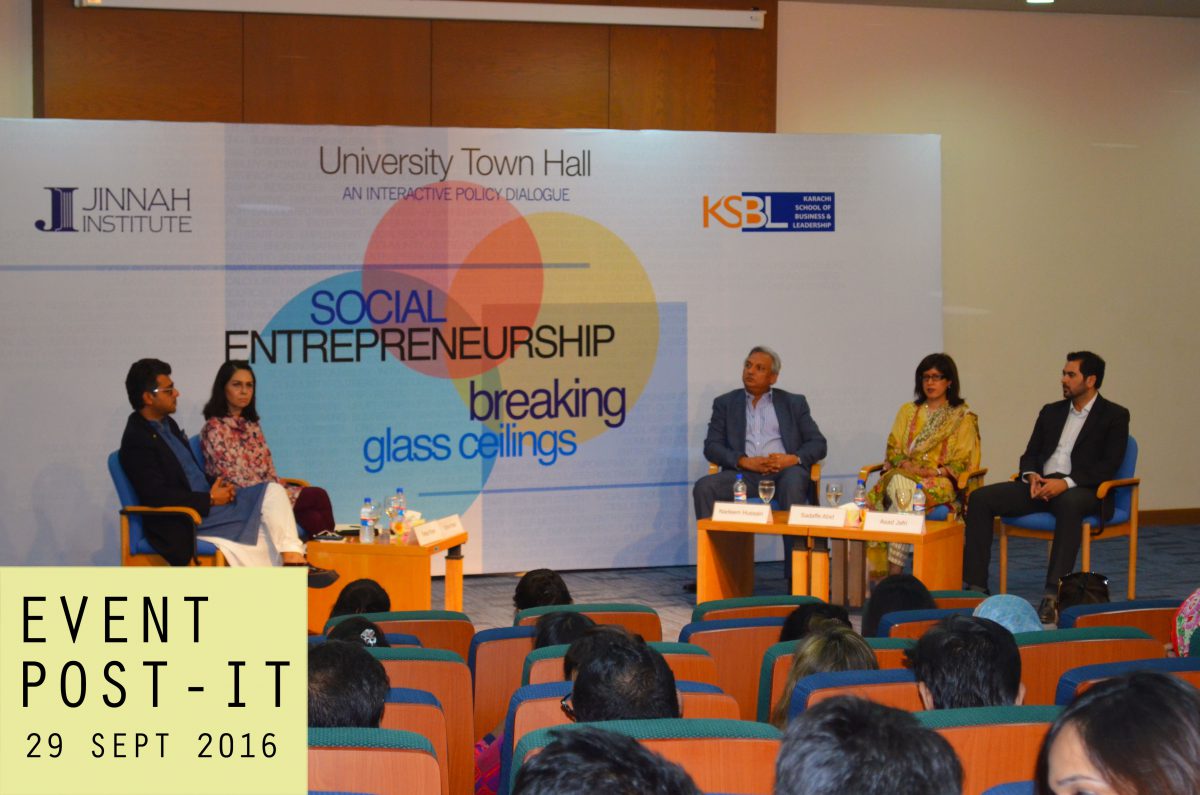Townhall
Social Entrepreneurship: Breaking Glass Ceilings
Date: September 29, 2016
Pakistan’s social entrepreneurship eco-system still requires a dedicated investor and knowledge base to build socially responsible businesses and contribute to youth employment; this was the main focus of speakers at the University town hall on “Social Entrepreneurship: Breaking Glass Ceilings” held at the Karachi School of Business and Leadership on Thursday by Jinnah Institute and KSBL.
Social entrepreneurship serves to bridge a critical gap between commercial interests and social well-being. Through the application of innovative business models, social enterprises aim to create impacts that are sustainable and socially optimal. With an increasing interest in social entrepreneurship among Pakistan’s rising youth cohort, Jinnah Institute brought top business leaders, investors, and entrepreneurs to hold an interactive dialogue with students, young professionals and aspiring entrepreneurs. Some of the core issues discussed included the establishment of an ecosystem for social entrepreneurs, access to finances, access to markets and mentorship.
Starting the dialogue, Nadeem Hussain said that socially sustainable enterprises in Pakistan still need strengthening of the eco-system, investors and mentors to support young men and women that want to start businesses targeting service provision for the poor in Pakistan. He added that unfortunately even today, most loans are going to old businesses instead of supporting new business ideas of the youth cohort. He said that it was unfortunate that universities in Pakistan focused on creating business managers rather than business owners. Asad Jafri added that ACUMEN is one such platform which invests in leaders that serve the bottom of pyramid.
Faraz Khan indicated that unlike the west, entrepreneurship was not discussed at homes and in schools in Pakistan. He said that one of the most important challenges here, was to make discussions on entrepreneurship common at homes and in universities. Once these conversations are taken to public spaces, it would not only encourage students to start businesses, but would also validate their ideas.
Saddafe Abid from CIRCLE shared her experience of starting one of Pakistan’s largest socially sustainable microfinance institutions and shared with university students her work in supporting women entrepreneurs in Pakistan. Uzma Khan from INJAAZ said that the need of the hour was to focus on developing livelihoods which also help communities. She added that mentorship played a key role in polishing business ideas and providing support to young entrepreneurs.
The session was attended by an array of young professionals, alumni of KSBL’s MBA program, and students from various local universities. The audience also included representatives from small NGOs working on the promotion of social enterprises.
This is Jinnah Institute’s second University Town Hall under the Open Democracy Initiative. The Town Hall series will bring Pakistan’s top analysts and academics to universities for interactive dialogues on pressing challenges facing youth in society.
Coverage: Daily Times, Daily City Centre

